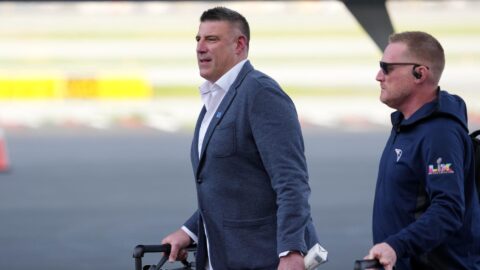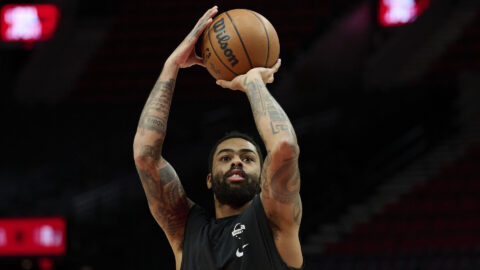Editor’s Note: Bruins head coach Claude Julien took over a Bruins squad in 2007 that had finished last in the Northeast Division for two straight seasons and led it to playoff berths in each of his first three seasons with the club. He guided the Bruins to their first playoff series wins in a decade in the past two years, earning the Jack Adams Trophy as the NHL’s coach of the year in 2008-09. Julien recently sat down with NESN.com Bruins beat writer Douglas Flynn for an exclusive interview, discussing his coaching background, his approach to the game and his future plans and goals. In the first part of a three-part series, Julien reveals how he got his start in coaching, the challenges he faced on his journey to Boston and the mentors who influenced him along the way.
WILMINGTON, Mass. — Technically, Claude Julien‘s coaching career didn’t begin until 1996, when he stepped behind the bench for the Hull Olympiques of the Quebec Major Junior Hockey League.
In reality, Julien had begun assuming coaching duties nearly a decade earlier.
“I remember having Doug Carpenter as a coach,” said Julien, referring to his coach with the Halifax Citadels of the American Hockey League in 1988-89. “I was at the tail end of my career in my late 20s and [playing] in the American League. Often times I was paired off with a young player and [Carpenter] asked me one day, ‘Have you thought about coaching?’ It got me thinking about it, and as my career was nearing an end I started thinking more about it.”
Julien hung on to his playing dreams for a few more seasons, returning to Halifax in 1989-90, then playing for the Kansas City Blades in the old International Hockey League for a season, before returning to the AHL for one final campaign in Moncton in 1991-92. But after playing 14 games with Quebec in 1984-85 and 1985-86, Julien never got another call to the Show, and the endless bus rides in the minors had long lost their luster.
Julien was ready to hang up the skates. He just wasn’t sure what he would do next.
“I think when I retired, I was about 32 years old, and I retired because I was still in the minors and at one point you have to say, ‘Well, you’ve got to look at the future,'” said Julien, who turned 50 in April. “Being in the minors longer than that, to me, wasn’t the right route, so whether it’s in hockey or in the real world, I still felt I was young enough to go in a different direction.
“At one point I thought about being a fireman or maybe a policeman or something in the working world,” continued Julien. “I didn’t want to get to the stage where I was too old and there wouldn’t be any opportunities anywhere else.”
But Julien wasn’t sure what life without the regimen that hockey had provided would be like.
“The toughest thing, to be honest, was that I had left home at the age of 16 and had been in the same routine for more or less 16 years, and one day to just break that routine was probably the toughest thing,” said Julien. “You’re used to getting up every morning and going to the rink, and for about a year it was totally, totally different. It took me a while to adjust. That’s the biggest adjustment for people when they retire. They change their routine. And for the one year I didn’t coach, I went from playing to not doing anything before I started coaching juniors. When I started coaching after that year, that routine kind of came back and I started feeling comfortable again.”
Julien never strayed far from hockey, even though his initial efforts to pursue professional coaching positions didn’t work out as hoped.
“I had a couple organizations approach me and it didn’t quite pan out,” said Julien. “So I just went back home to Ottawa and got involved in community hockey.”
That fledgling beginning eventually led to Hull, where he took over the Olympiques and led them to a Memorial Cup championship in his first season behind the bench.
For many young coaches, leaving behind a playing career can be the biggest challenge of moving into the coaching ranks. Losing direct control of what happens on the ice and relying on others to carry out your instructions can be a tough adjustment, but Julien was ready to make the switch.
“For me, it really felt like it was an easy transition,” said Julien. “I was still doing something I was comfortable with. I always felt as a player that I had pretty good hockey sense. That was one of my strong points as a player, so it just seemed to kind of flow well together.”
It helped that Julien started in the junior ranks, where his passion for teaching the game meshed perfectly with the needs of his young charges.
“When you enjoy the game and enjoy coaching, starting off at the junior level with 16-year-olds, you really have to enjoy the teaching aspect of it and really have to want to help them become better players,” said Julien. “At that age, they’re obviously trying to become pros, and somewhere along the way you want to try to have an impact on their careers and on their lives. What I had done in the minors with the younger players I had worked with as a defense partner, I was kind of doing the same thing, but with 20-plus players.”
After four seasons in Hull, Julien reached the pro ranks with Hamilton, Montreal’s AHL affiliate. Three years there led to his first chance at coaching in the NHL with the Canadiens, a stint that lasted parts of three seasons from 2002-06. He then spent one year with New Jersey before being dismissed late in the 2006-07 season, despite having the Devils in first place in the Atlantic Division. But he landed on his feet when offered the Bruins’ job the following summer.
Julien has coached just five different teams, but his playing days exposed him to plenty of different coaching styles. He played for four different coaches with two teams in juniors with Oshawa and Windsor of what was then called the Ontario Hockey Association. He followed that up with a pro career that lasted 12 seasons, playing for 13 coaches on nine teams in four different leagues. And every one of those coaches had an impact on the style he has adopted behind the bench.
“I think I’ve taken a little bit from everybody,” said Julien. “There’s always something you like from a coach and something you don’t like as much, and I’m sure our players here are the same way in regards to me. You try to take the things that you like and that suit you well and grab those things, but at the same time you really have to be yourself and your personality really has to show.”
Julien’s personality isn’t quite as colorful as a few of men he once played for, though.
“I’ve had a lot of coaches,” said Julien. “Tex Evans used to be in Hartford. He was one of my first coaches in the old Central League in Salt Lake City. That was St. Louis’ farm team. He was a very quiet but real hard-nosed person. He was actually really tame as a coach, but his silence spoke volumes and you knew where you stood with him. So you learned from that.”
Julien, who signed with the Blues as an undrafted free agent out of juniors, actually changed organizations because of a coaching move. His rights were transferred to Quebec as part of the compensation for the Blues signing coach Jacques Demers away from the Nordiques. Julien played his only NHL games with the Nordiques, and his time in the Quebec organization exposed him to a few more memorable bench bosses.
“I also had Michel Bergeron, who coached the Nordiques,” said Julien. “He was the complete opposite [of Evans]. He was loud, screamed a lot behind the bench, but then his personality wasn’t always as mean as it sounded. He had a bigger bark than a bite. You kind of learn from everybody. I had Robbie Ftorek, who’s been here [as Bruins coach from 2001-03], and I’ve had numerous, numerous coaches. I just kind of took a little bit from everybody and just tried, I guess, to mold myself into what I felt would be the best coach possible.”
On Tuesday, Julien reveals the coaching style he developed out of all those influences, and discusses the differences between coaching in juniors and the pros, as well as the delicate balancing act between implementing systems and tactics and managing egos as an NHL head coach.



